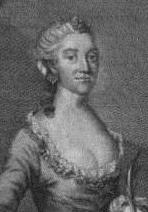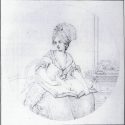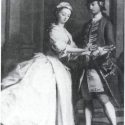Anna Catharina von Passow was one of the most popular stage actors of her time, born into a noble family, but due to financial difficulties sought employment with a troupe of actors at the Den danske Skueplads (the present Royal Danish Theatre) in 1748. Out of consideration for her high-ranking family, she performed under the stage name Materna. When she left the stage in 1753 to marry the first lieutenant Christian Albrecht von Passow, she wrote a farewell letter to Holberg expressing her gratitude for his kindness and the important role he had played in her life.
She later returned to the stage for the groundbreaking, private performance of the first Danish singspiel Gram og Signe, 1757, and wrote a number of dramatic works herself, the two small plays Elskovs- eller Kierligheds-Feyl and Den uventede Forlibelse eller Cupido Philosoph, both in 1757. In the latter, she was the first person to use material from Nordic mythology in drama as a result of her being inspired by her reading of Paul Henri Mallet’s Nordic mythology.
Her key work is the bourgeois comedy Marianne eller Det frie Val, 1757, in which a young female citizen is at the centre of the plot and is the pivot of the action. Her comedies were translated into German and French, and at the time of her death she was in the process of translating Don Quixote.





